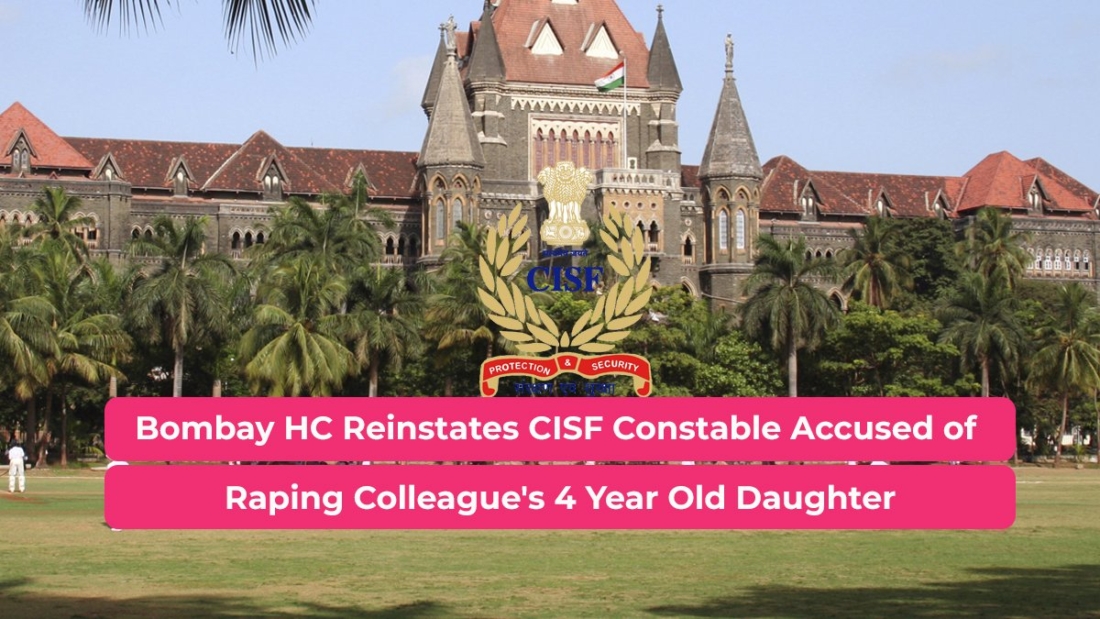On 14.01.2022, in the case of U T Vs. Director General, CISF, the Bombay High Court revoked a dismissal order against the accused due to the absence of a disciplinary enquiry and labeled the move as too extreme and prejudicial.
Facts– In 2018, an FIR was filed against Udaynath Tirkey (“Petitioner”) who was serving as a constable at Central Industrial Security Force (CISF). According to the FIR, he had sexually assaulted the daughter of his colleague who was four years old and was charged under Section 376 of the Indian Penal Code and 4 and 8 of the Protection of Children from Sexual Offences Act (‘POCSO Act’).
A preliminary enquiry was conducted after which the Intelligence Wing of the CISF made a report on the same and an order was passed dismissing the petitioner from service. The petitioner filed multiple appeals to various authorities after the dismissal of which he approached the Court.
Arguments–
- The Counsel for the petitioner submitted that there was a delay in filing the FIR, according to which the victim’s father brought her to a hospital because she was having difficulty in passing urine and she was examined by a doctor, who informed him that the victim’s hymen was ruptured. However, this statement did not make it conclusive that the victim had informed anything of this sort to the father. Contrary to this, the petitioner submitted that the victim was brought to the hospital because she was complaining of itching in her private parts and she was recommended a medical test for urinary tract infection.
- After the lodging of the report, the victim was sent for a medical examination which revealed that neither was the hymen ruptured nor was there any injury in the private parts.
- On the basis of the above facts, the petitioner claimed that the report was filed because one of the authorities bore a grudge against him and due to these malafides, the order for suspension was passed even before the registration of the crime.
- The petitioner also claimed that he was not given a departmental hearing nor was he allowed to defend the charges against him.
The counsel for the Respondents submitted that under the applicable service rules, it was not reasonable to conduct a regular, departmental enquiry, keeping in mind the facts and circumstances of the case. The Hon’ble Supreme Court examined this aspect in great detail in the case of Union of India Vs. Tulsiram Patel (1985) where it was held that a departmental enquiry could be avoided in those cases where there was a chance that the accused would terrorize or traumatize the victim or the witnesses or a chance that the government servant may misuse his power to the detriment of the trial or enquiry. Enumerating on these factors, the counsel submitted that the petitioner had committed a heinous crime and it would not be right to subject the victim to further trauma by cross-examination.
Observations of the Court–
- The Court was not satisfied with the reasons given by the Respondents to not conduct a regular departmental enquiry.
- JJ, Borkar and Varale remarked that-
“We must state that dismissal from service is the harshest punishment, and it is akin to economic death penalty for an employee. Therefore, more objective approach was required to be adopted by the disciplinary authority while dispensing with the inquiry. However, it appears from the order impugned that respondent No.4 disciplinary authority had got swayed away by the fact that petitioner is involved in heinous crime and conducting of disciplinary inquiry may hurt the sentiments and emotions of local residents and fellow members of the force.”
The Court passed an order for the reinstatement of the Petitioner and quashed all the previous orders while giving the Respondents the liberty to conduct disciplinary proceedings against the Respondent or to suspend him from service.
– Vaishali Jain, Advocate & Associate – Child Safety at Work & Rhea Bazaz, Final Year Student, Symbiosis Law School, Pune
 Cart is empty
Cart is empty 

